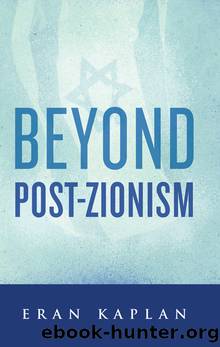Beyond Post-Zionism by Eran Kaplan

Author:Eran Kaplan [Kaplan, Eran]
Language: eng
Format: epub
Tags: History, Middle East, Israel & Palestine, Political Science, Political Ideologies, Nationalism & Patriotism, Social Science, Jewish Studies
ISBN: 9781438454351
Google: UpQuBgAAQBAJ
Publisher: SUNY Press
Published: 2015-01-08T00:27:02+00:00
Herzl made here two very interesting claims for someone who three years later would commence writing a novel that, at least stylistically, derives its inspiration from the utopian genre: He is not a utopian, and he does not believe that universal reform would bring about resolution to the Jewish problem. All that he was willing to acknowledge in the conclusion of The Jewish State, as far as the messianic sentiment is concerned, was that, âThe world will be freed by our liberty.â While in his diaries, in which he chronicled what he described as his âJewish adventure,â he wrote, âWhat then differentiates a plan from a Utopia? I shall now tell you in imprecise language: the vitality which is inherent in a plan and not in a Utopia. ⦠There have been plenty of before and after Thomas More, but no rational person ever thought of putting them into practice. They are entertaining, but not stirring.â21
So why did Herzl make the (at least formal) choice of the utopian novel? A partial answer might be found in his diaries. On March 14, 1901, he wrote, âI am now industriously working on Altneuland. My hopes for practical success have now disintegrated. My life is no novel now. So the novel is my life.â22 When he began his Zionist project, Herzl was highly optimistic, if not out-and-out naïve. He realized that his idea was revolutionary and would be difficult to carry out, but he believed that the historical forces mandating the creation of a Jewish state were so powerful that nothing could prevent them from coming to their inevitable conclusion. He addressed this very question in the concluding chapter of The Jewish State:
The news of the formation of our Jewish Company will be carried in a single day to the remotest ends of the earth by the lightning speed of our telegraph wires. And immediate relief will ensue. ⦠The Maccabeans will rise again. Let me repeat once more my opening words: The Jews who wish for a State will have it. We shall live at last as free men on our own soil, and die peacefully in our own homes.
But as time passed, Herzl realized that bringing about the creation of a Jewish state would be much more difficult than he earlier anticipated. Although he had some remarkable success in spreading his ideas among different Jewish communities and groups and even found a sympathetic ear among some European leaders, he did not experience the mass awakening that he assumed would follow the publication of The Jewish State and the convening of the first Zionist Congresses. By the beginning of the twentieth century, his diaries betray a growing sense of gloom and resignation and fears that all his efforts on behalf of the Zionist cause were in vain. As Stefan Zweig has observed,
The first moment, while the idea was still a dream of vague outline, was decidedly the happiest in Herzlâs short life. As soon as he began to fix his aims in actual space, and to unite the forces, he was made to realize how divided his people had become.
Download
This site does not store any files on its server. We only index and link to content provided by other sites. Please contact the content providers to delete copyright contents if any and email us, we'll remove relevant links or contents immediately.
american english file 1 student book 3rd edition by Unknown(618)
Phoenicians among Others: Why Migrants Mattered in the Ancient Mediterranean by Denise Demetriou(613)
Verus Israel: Study of the Relations Between Christians and Jews in the Roman Empire, AD 135-425 by Marcel Simon(595)
Basic japanese A grammar and workbook by Unknown(586)
Caesar Rules: The Emperor in the Changing Roman World (c. 50 BC â AD 565) by Olivier Hekster(582)
Europe, Strategy and Armed Forces by Sven Biscop Jo Coelmont(525)
Give Me Liberty, Seventh Edition by Foner Eric & DuVal Kathleen & McGirr Lisa(502)
Banned in the U.S.A. : A Reference Guide to Book Censorship in Schools and Public Libraries by Herbert N. Foerstel(492)
The Roman World 44 BC-AD 180 by Martin Goodman(480)
Reading Colonial Japan by Mason Michele;Lee Helen;(472)
Introducing Christian Ethics by Samuel Wells and Ben Quash with Rebekah Eklund(469)
DS001-THE MAN OF BRONZE by J.R.A(467)
The Dangerous Life and Ideas of Diogenes the Cynic by Jean-Manuel Roubineau(459)
Imperial Rome AD 193 - 284 by Ando Clifford(458)
The Oxford History of World War II by Richard Overy(456)
Catiline by Henrik Ibsen--Delphi Classics (Illustrated) by Henrik Ibsen(446)
Language Hacking Mandarin by Benny Lewis & Dr. Licheng Gu(416)
Literary Mathematics by Michael Gavin;(410)
Brand by Henrik Ibsen--Delphi Classics (Illustrated) by Henrik Ibsen(405)
